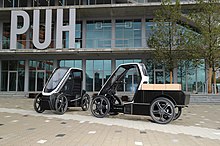
A human–electric hybrid vehicle is a hybrid vehicle, or more specifically a hybrid human-powered vehicle, whose drivetrain consists of a human being and an electric motor/generator (and one or more electricity-storage device(s) such as a battery(ies) or ultracapacitor(s)). Some vehicles are able to operate off both human power and be plugged in to operate on battery power.
It can have characteristics of a bicycle, velomobile or other lightweight human operated vehicles with the addition of faster acceleration and regenerative braking, allowing a higher average velocity, especially in hilly terrain.

Some vehicles have a clutch and three or more wheels, allowing the operator to continue pedaling and charge up the electricity-storage device during traffic stops.
See also
- Pedelec – Bicycle where the rider's pedalling is assisted by an electric motor
- Velomobile – Human-powered vehicle
- Quadracycle – Four-wheeled vehicle with pedals
- Velocar – Historical velomobile
- Twike – German electric vehicle manufacturer
- Quadracycle – Four-wheeled vehicle with pedals
- Quadricycle – Small motorized four wheeled vehicle
- Motorized quadricycle – EU vehicle category for four-wheeled microcarsPages displaying short descriptions of redirect targets (Microcar – Smallest automobile classification)
References
- "EV Charging Technologies with Evie". momentumenergy. Retrieved 2024-10-15.
- Edwards, Lin (August 17, 2010). "Human-electric hybrid car expected next year (w/ Video)". phys.org.
- Hanlon, Mike (April 30, 2006). "High performance electric-human hybrid bicycle". New Atlas.
- Danigelis, Alyssa (Aug 14, 2010). "'HUMAN-ELECTRIC' HYBRID CAR GOES 30 MPH UPHILL".
- "HE Human Electric Hybrid Vehicle | gadgettastic". Archived from the original on 2011-10-16. Retrieved 2011-09-01.
This vehicle-related article is a stub. You can help Misplaced Pages by expanding it. |